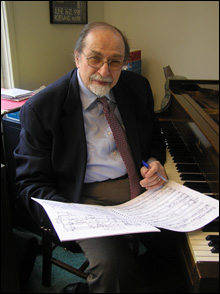
TICKLING THE IVORIES: Elliott Schwartz. |
If you associate classical music with your grandparents, highbrow snobbery, or stuffy concert halls, it’s time to listen up. Elliott Schwartz, who has been a composer, professor and musician in Maine for 43 years, reminds us why classical music is teetering on the edge of revival.
In his lecture series entitled "Evenings at the Piano" at Portland Conservatory, which began on September 17 and will continue with three more lectures, Schwartz covers not only the history of the piano, but also gives his audience a brief glance at some of the composers who transformed Western classical music into the diverse genre it is today.
In the first lecture, Schwartz moved somewhat chronologically through Monteverdi, Bach, Scarlatti, Mozart, and stopped short of finishing an examination of the dramatic piano works of Beethoven. There were brief explanations of temperament (the way in which the piano evens-out the natural, but slightly imperfect distances between overtones), prelude, and fugue relationships, and sonata form interspersed with musical examples recorded by famous pianists and piped through the Conservatory’s embarrassingly inadequate CD player or stiffly hashed out by Schwartz himself.
| "Evenings at the Piano" | with Elliott Schwartz | 7-9 pm October 15, November 19, December 10 | at the Portland Conservatory, 116 Free St, Portland | $10 | 207.775.3356 | Shaker Variations for Viola and Cello | composed by Elliott Schwartz | performed by Portland String Quartet | 3 pm October 21 | Woodford's Congregational Church, Woodford St, Portland | $20; 21 & under free |
“Watching a performer can be as rewarding as listening to him perform,” Schwartz quipped at one point. Having a performer there might have been an interesting addition to the lecture and certainly an improvement over the maxed-out CD player speakers.But this is not meant to be a performance. Schwartz promises that the upcoming lectures will move through the 19th century and up to the present, touching on the composers who paid particular attention to the piano, as well as the evolution of the instrument itself.
Schwartz sat down with the Portland Phoenix for a conversation about the history and future of classical music.
What was it like to teach at Bowdoin during the sixties?
That was such an interesting time for classical music. Some of the most influential composers were still alive and creating new work at the same time as the Woodstock generation was developing their own version of music that was as different from what their parents were listening to as possible.
Is that what has created the divide between classical and popular music?
Partially. Though as far back as the early 19th century, the newly formed “middle class” began buying up pianos and learning to play as a symbol of social status. They had their children take piano lessons. Composers began writing for lower-level performers because it was a profitable thing to do. Then they would compose these incredibly difficult pieces for the virtuosi. The pieces that the public wanted to see performed were works that they would never be able to play themselves, which increased the divide between music for the common man and music for the professionals.